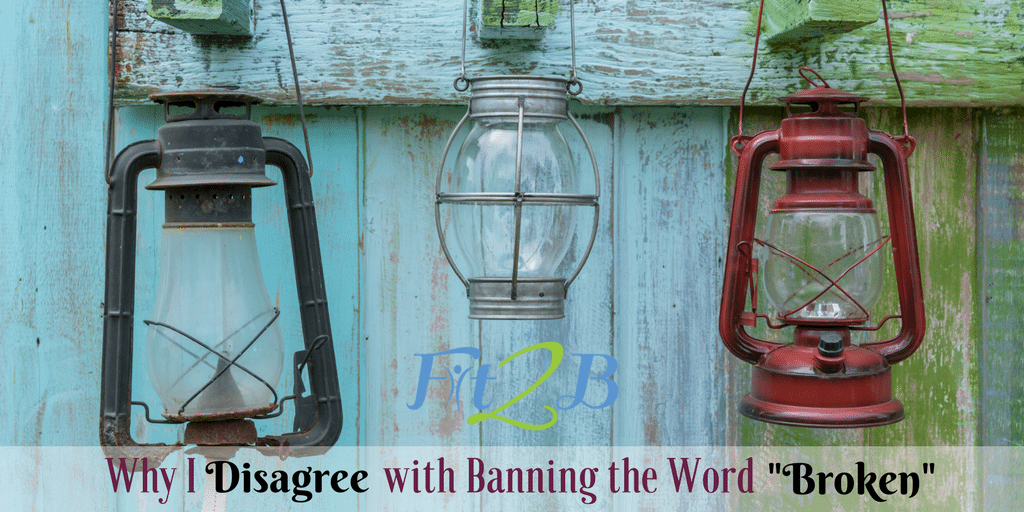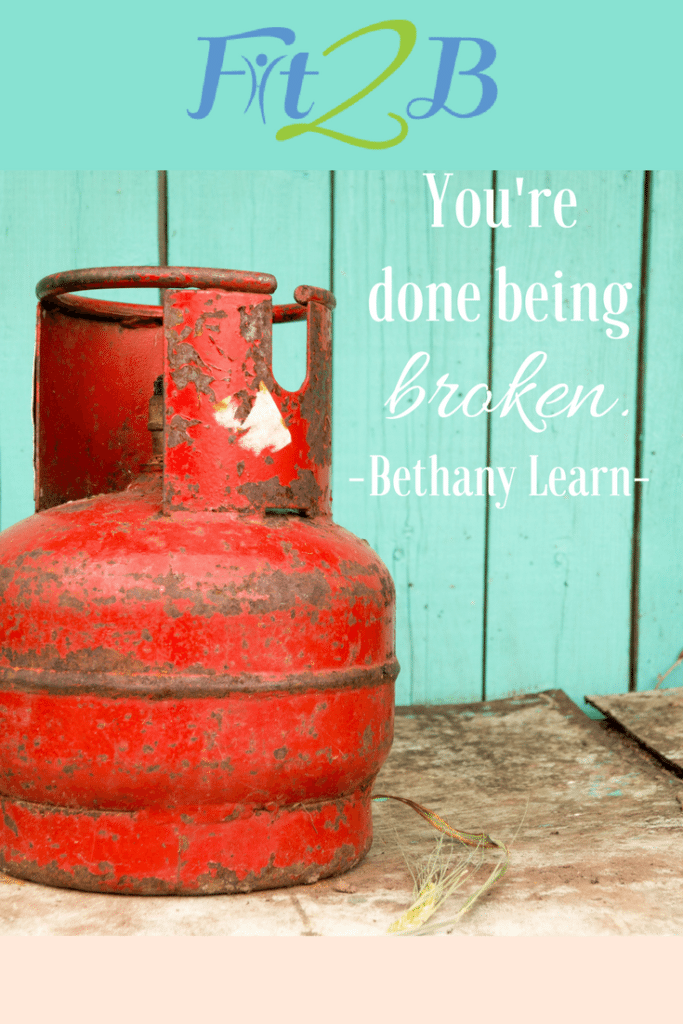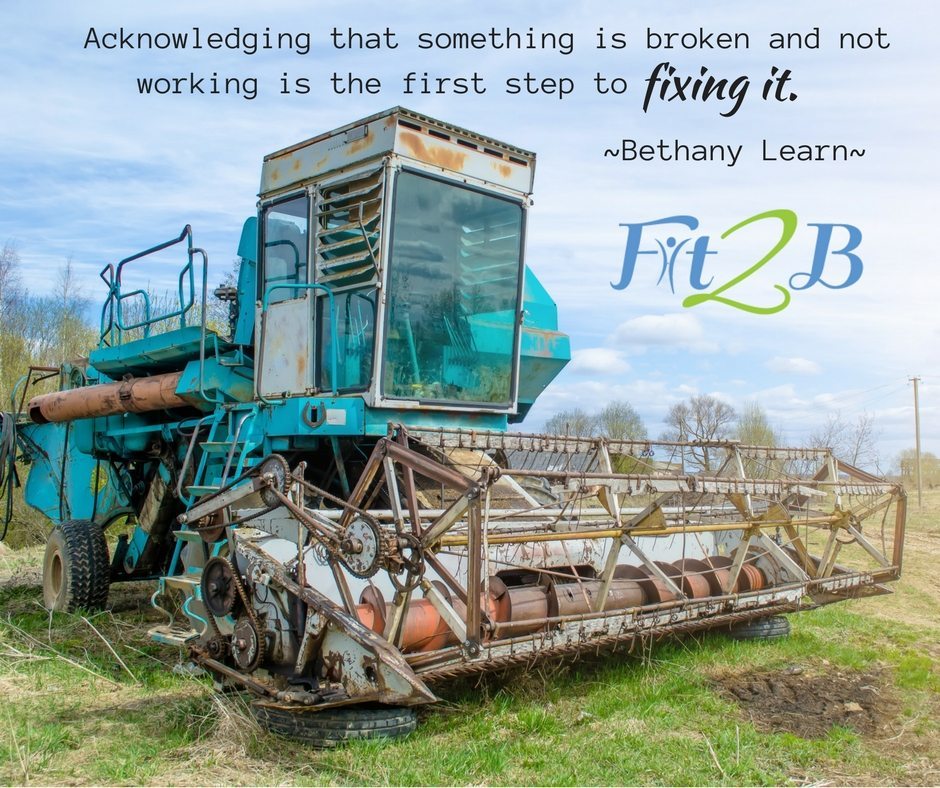Blog, Uncategorized
Why I Disagree with Banning the Word “Broken”
Words carry weight. In a rapidly-blending global culture, every word is scrutinized, weighed, and judged. Phrases that were once common to one group are now understood to be inflammatory and hurtful to another group, so they are understandably banned and become “non-politically correct.” However, I’ve also seen quite a few articles written to fitness professionals about discouraging our clients from using certain words.
Clearly, our goal should always be to cultivate trust and build up the morale of those we are training, while avoiding any type of degrading term. However, several recent threads on avoiding the word “broken” really stumped me.
I’ve used that word a lot here on Fit2B. For example, I’ve likened abdominals with diastasis recti to being broken bellies. I’ve never had a single follower get angry at that term; rather, I’ve heard back a lot of resonance.
It’s also the word I used to describe myself after having kids because it’s how I genuinely felt: broken. My core didn’t seem to respond the way it had before.
I wobbled when I walked. My core wasn’t functioning the way I expected it. Its jello-like instability made me feel like I was living in someone else’s body because my core had been so firm before babies and during pregnancy. Voicing those memories was part of sharing my story, my mission.
I puzzled and pondered for many cumulative hours about the issue some people have with the word “broken” because it has never bothered me. It’s a word that brings comfort and hope to me, but obviously that wasn’t the same for everyone.
Why do I hear that word differently than some of my colleagues? Why do some feel condemned and utterly lost when they hear that word or dare whisper it to themselves?
It finally dawned on me as I watched my husband out in the snow, riding a faded blue 4-wheeler held together by zip ties. He was happily towing our kids on sleds that have been repaired with duct tape. My daughter and son were both wearing some type of hand-me-down received from their older cousins.
I don’t fear brokenness because it’s never been final in my life.
Am I poor? Do I not make enough? Why don’t I toss out weathered items and buy new ones? Well, here’s the thing.
I was raised by a genius inventor daddy with multiple patents dreamed up as he faced seemingly insurmountable obstacles. My mother could sew a whole new “Sunday-go-to-meeting” dress out of my sister’s old hand-me-downs, and she was the queen of casseroles made from leftovers that anyone else would have tossed.
Nowadays, I live on a small rural farm. The man I married is a talented mechanic who has carried on his parents’ belief that every scrap of wood and every old car should be saved, in case you need it someday.
All we have to do is fix it, and it will run just fine again.
At first glance, our homestead probably looks like hillbilly central, but my husband knows about each object and what its value is, no matter how rusty or “broken” it appears to be.
When I was a little girl, I’d carry my fractured, torn toys straight to my mom or dad. I’d say, “Here, this is broken.” And they’d say, “Oh dear, well let’s sew [or nail or weld or duct tape] that back together, and it’ll be allllll fixed.”
Saying something was broken was the moment hope was restored.
Sure, I’d feel sad for a moment when my toy first broke, but that feeling was soon replaced by hope that stemmed from trust: other things had been fixed before; all I had to do was tell someone.
 I always enjoyed watching how it was fixed. I still do. I love working with a client and seeing her face light up when her core connects. I love receiving letters from members of Fit2B who are now running races without leaking, when they could barely walk and carry their kid at the same time before doing my workouts.
I always enjoyed watching how it was fixed. I still do. I love working with a client and seeing her face light up when her core connects. I love receiving letters from members of Fit2B who are now running races without leaking, when they could barely walk and carry their kid at the same time before doing my workouts.
These days, though, our landfills are overflowing with broken things that no one knows how to fix. I’ll admit, I toss quite a few toys my kids have brought to me for fixing because they’re cheap plastic—and what am I supposed to do when one of the bazzilion crucial parts goes missing, and duct tape won’t even mend it?
Human muscle and fascia is fixable. Physical therapy and restorative exercise have been proven to help conditions once thought untreatable, such as pelvic organ prolapse, diastasis recti, urinary and fecal incontinence, degenerative disc disease. Consider how exercise fights osteoporosis, heart disease, and diabetes!
You’re broken—but you’re not.
My heart here on Fit2B is to help my clients see that acknowledging that something is broken and not working is the first step to fixing it.
 I think, at the end of each day, my colleagues and I are truly on the same page: we don’t want people finding their identity in brokenness and wearing it like a badge, leaning on it as an excuse, or using it as a “note to the teacher” to get out of various motions.
I think, at the end of each day, my colleagues and I are truly on the same page: we don’t want people finding their identity in brokenness and wearing it like a badge, leaning on it as an excuse, or using it as a “note to the teacher” to get out of various motions.
You’re here to go beyond patching yourself together with duct tape, zip ties, and splints. You’re done being broken. You’re holding up the pieces and asking for function to be restored. You’re done leaving yourself on the trash heap, and you’re ready to do the mechanical work required to get yourself roaring again.
Here is more reading:
Biomechanics & Your Core: Part 5 of The Unclosed Core Series on Fit2B
Nutritious Movement: Move Your DNA
Anatomy Trains: Webinar About Fascia
Belly Love: Seeing Beauty In Brokenness
I’d love for you to leave me a comment and tell me what you think about the word “broken.” Should people be corrected for admitting they feel that way? Should professionals not use or acknowledge it? Does it promote a victim mentality?

